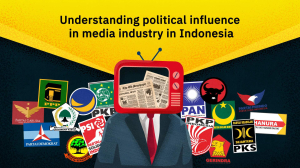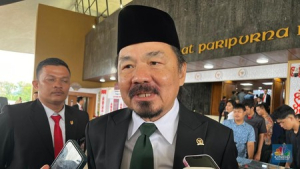Presidential candidates in bed with 'Nine Dragons'
Indonesia's wealthy conglomerates, popularly known as the "Nine Dragons", are taking a wait-and-see measure while analyzing the situation before making a decision which presidential candidate they will support in the 2024 general elections.
Emrus Sihombing, a political expert and lecturer at the Pelita Harapan University, said that these wealthy conglomerates would allocate supports to the potential presidential candidates through logistics, funds and other forms of supports based on their analysis.
"A 'dragon' has experts who serve as advisers or employees they pay monthly. Just like university lecturers, the experts have their own expertise. Some of these experts are graduates from foreign universities and they provide advice to the 'dragons'," he told Indonesia Business Post on October 20, 2022. He added that these experts will determine which candidates they should support based on their political affiliations.
The conglomerates have aspirations to create a pluralistic society, in which diversity is complemented by harmony. They cannot effectively run their business unless the political system is inclusive and respects diversity and unity. An inclusive community recognizes the rights of all its members. The successful operation of a business depends on respecting individual rights.
"Consequently, it should not be surprising that conglomerates can flourish in a democratic society. In authoritarian or centralist states, conglomerates lack of freedom," Sihombing explained.
Leader's criteria to benefit conglomerates
In his opinion, these wealthy businesspeople always seek an inclusive and pluralistic leader. Due to the potential impact on their business, they are apathetic to support narrow identity politics.
"Democracies are pluralistic. Democracy and capitalism are two sides of the same coin. Where capitalism grows, democracy will follow," said Sihombing.
The conglomerates seek to elect specific presidential candidates to advance their business interests. As a result, they contribute based on their logistical or financial capabilities. "Mostly in logistics and funds," he stated.
Ubedilah Badrun, a political analyst and lecturer at the Jakarta State University (UNJ), believed the presidential election would be very costly. A successful candidate should have a minimum of IDR 10 trillion to win presidential elections, including in year 2024.
Unfortunately, not all presidential candidates who will run in 2024 have sufficient financial resources to win the election. In such a scenario, the candidates will require financial support from wealthy conglomerates and oligarchs.
"At the same time, the conglomerates are eager to 'buy' politics or to support presidential candidates, so they are able to gain economic and political benefits if the candidates they support win the election," Badrun said.
Sihombing emphasized that network would be another valuable contribution. Due to their extensive networks in state institutions, the "Nine Dragons" do not limit their supports on logistics or funds. Officials with significant influence over the state, the government and political parties can be summoned informally by them.
Supports for three potential candidates
According to Badrun, the wealthiest conglomerates will likely support three names in 2024: Central Java Governor Ganjar Pranowo, former Jakarta Governor Anies Baswedan and Defense Minister Prabowo Subianto. Meanwhile, the mid-level conglomerates have debated over their supports for vice presidential candidates for 2024.
Considering Sihombing's analysis, Ganjar appears to be a presidential candidate who shares the interests of most businesspeople in promoting pluralism.
On the other hand, Anies' commitment to pluralism has been questioned by many. As a politician, Anies had supported pluralism in the past. Nevertheless, when he ran for the Jakarta governor, he knew promoting pluralism would not help him win. As a result, he exploited narrow identity politics.
"In the future, if he believes he is unlikely to win an election by promoting identity politics, he will change again to promote pluralism because politics is a fluid and ever-changing process," Sihombing said.
Business interest groups are concerned with the economy, business, policy and law, he added. Consequently, when they support a candidate, they expect a return on their investment. "There is no such thing as free lunch," he said.
Backroom deals
Through their mediators, the "Nine Dragons" have backroom discussions and negotiations with candidates before they decide to support a certain candidate.
“Bluntly, they will say 'I am willing to help you, but what will I receive in return?'. In most cases, however, these negotiations are framed high-levelly,” Sihombing said.
According to Badrun, in such situation, the eventually elected president’s policy will prioritize the interest of the wealthy conglomerates instead of the interest of the people. “There will be a domination of interest if a candidate is under the control of the conglomerates since his/her candidacy,” he added.
The president will have difficulties in making a decision if he/she has to make a choice between two options. It is either he/she sides with the people or with the conglomerates.
However, Sihombing has a different view. He said the interests of the wealthy conglomerates aligned with the interests of the people in this negotiation. For instance, the government's tax holiday policy for businesses will result in the creation of more jobs for the people.
Nine Dragons: Who are they?
Sihombing described the "Nine Dragons" as a simplified nickname that categorizes more complex networks of wealthy Indonesian conglomerates. The number is significantly greater than nine. "They are the richest people in this country or the crazy rich Indonesians," he said.
Badrun estimates that around 50% of the 30 wealthiest men and women in Indonesia have channels through which they can financially support presidential and vice presidential candidates in the 2024 elections.
Political analyst and lecturer of the University of Indonesia (UI), Boni Hargens, presented a list of wealthy Indonesian individuals directly or indirectly linked to political power in his doctoral dissertation "Oligarchic Cartelization in Post-Soeharto Indonesia" in 2019. They are:
- Chairul Tanjung of CT Corps: Media, Banking and Retails. Net worth: US$ 4.6 billion.
- Putera Sampoerna of Sampoerna Strategic: Plantation and Agribusiness. Net worth: US$ 4.3 billion.
- Aburizal Bakrie of Bakrie Group: Mining, Construction, Telecommunication and Media. Net worth: US$ 2.05 billion.
- Sjamsul Nursalim of Gajah Tunggal Group: Tire. Net worth: US$ 2.0 billion.
- Mochtar Riady of Lippo Group: Property, Retail and Media. Net worth: US$ 2.0 billion.
- Peter Sondakh of Rajawali Corpora: Infrastructure, Mining, Property and Media. Net worth: US$ 1.8 billion.
- Aksa Mahmud of Bosowa Corporation: Mining, Automotive and Energy. Net worth: US$ 1.8 billion.
- Hary Tanoesoedibjo of MNC Group: Media. Net worth: US$ 1.8 billion.
- Garibaldi Boy Thohir of TNT Group: Mining. Net worth: US$ 1. 45 billion.
- Murdaya Poo and Siti Hartati Murdaya of Central Cipta Murdaya: Manufacturing and MICE. Net worth: US$ 1.4 billion.
- Prajogo Pangestu of Barito Group: Timber. Net worth: US$ 1.38 billion.
- Arifin Panigoro and Hilmi Panigoro of Medco International: Oil and gas. Net worth: US$ 1.3 billion.
- Rusdi Kirana of Lion Air Group: Airlines. Net worth: US$ 1.2 billion.
- Tommy Winata of Artha Graha Network: Property, Finance and Agroindustry. Net worth: US$ 930 million.
Apart from those names, there are other conglomerates who may subtly support presidential candidates. They are:
- Robert Hartono and Michael Hartono of Djarum Group: Cigarettes, Banking and Retails. Net worth US$ 14.8 billion.
- Anthony Salim from Salim Group: Foods, Banking, Retails, e-commerce and Plantation. Net worth: US$ 11 billion
- Franky Widjaja of Sinar Mas Group: Oil palm plantations, Mining, Shipping and Property. Net worth: US$10.5 billion.
Already have an account? Sign In
-
Start reading
Freemium
-
Monthly Subscription
30% OFF$26.03
$37.19/MonthCancel anytime
This offer is open to all new subscribers!
Subscribe now -
Yearly Subscription
33% OFF$228.13
$340.5/YearCancel anytime
This offer is open to all new subscribers!
Subscribe now





